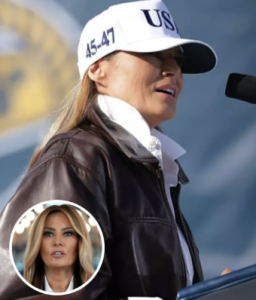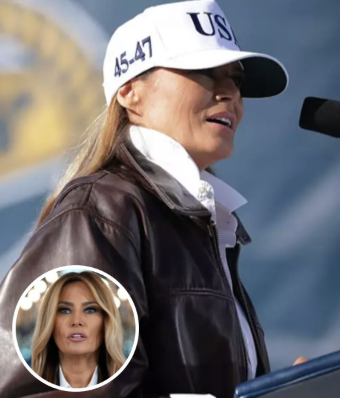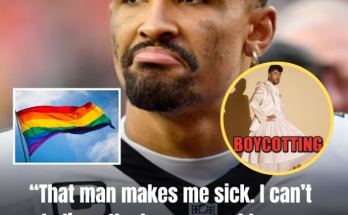
Melania Trump has never been a stranger to scrutiny, and her recent appearance at a U.S. Navy anniversary event proved that even a two-word greeting can spark a viral storm. During a ceremony honoring the 250th anniversary of the United States Navy in Norfolk, Virginia, the former First Lady stepped up to the podium to address sailors and their families. She smiled, waved, and opened her remarks with an energetic “Hooyah, Navy!” — a salute meant to honor and connect with her audience. But almost instantly, those two words became the subject of widespread mockery online. What was intended as a moment of respect turned into one of the week’s most talked-about viral clips.
“Hooyah” is a traditional cry of enthusiasm used by the U.S. Navy to signal agreement, determination, or esprit de corps. It’s similar to “Hoo-ah” in the Army or “Oorah” in the Marines. Within the Navy community, it’s a proud and familiar term, often shouted among sailors during training or ceremonies. However, hearing it from Melania Trump, whose carefully measured public image is known more for elegance than military slang, took many by surprise. The greeting caught people off guard, and the delivery—some said overly formal, others said awkward—added fuel to the fire. A simple greeting quickly became comedy material across social media platforms.
Clips from the event spread rapidly on X (formerly Twitter), TikTok, and Facebook, with many users posting captions like “When you’re trying too hard to fit in” or “Melania discovering Navy slang for the first time.” Some compared it to when politicians awkwardly use pop-culture slang in an effort to connect with younger audiences. Others joked about her accent making the phrase sound unusual or out of place. In the video, after Melania’s “Hooyah, Navy!” the crowd of sailors responded with a polite but subdued “Hooyah!” in return. The moment might have ended there, but once the clip hit the internet, it took on a life of its own.
Part of what made the moment go viral was the contrast between Melania’s typically reserved demeanor and the raw, shouted enthusiasm associated with military chants. For years, her public persona has been marked by restraint—measured smiles, slow speech, and a sense of distance from overt displays of emotion. So when she suddenly opened her speech with a full-throated “Hooyah,” many viewers found it jarring, even humorous. It seemed out of character for someone who often appears detached or stoic at public events. That gap between personality and performance became the perfect setup for viral ridicule.
Critics online used the clip as a springboard for commentary not just on Melania herself but on how political figures often struggle to appear relatable. Social media users joked that the greeting felt rehearsed, almost like a line she had been told to include by a speechwriter hoping for an emotional connection. Some said it reminded them of a celebrity trying to use insider slang to win approval from a group they barely understand. Supporters, on the other hand, defended her, saying the mockery was unfair. They argued that she was simply showing respect and enthusiasm for the Navy and that critics were reading too much into a light-hearted moment. To them, the backlash illustrated how any action by a member of the Trump family, no matter how small, can become an instant controversy.
The controversy also reflects a broader pattern in modern media culture. Public figures today live under constant digital magnification, where every facial expression, mispronunciation, or gesture can be replayed millions of times. A generation ago, this kind of moment might have been forgotten minutes after it happened. But now, with endless social media feeds hungry for quick, shareable content, even a two-second clip can dominate online conversations for days. The “Hooyah, Navy” greeting became meme fodder precisely because it was short, distinctive, and slightly awkward—exactly the ingredients needed for viral humor.
Some analysts noted the irony of the situation. The former First Lady was attempting to celebrate an institution known for discipline, loyalty, and strength, yet the focus shifted entirely to a fleeting misstep in tone. It’s a reminder that modern political optics often overshadow substance. Her speech went on to praise the dedication of sailors and their families, honor the Navy’s long tradition of service, and express gratitude for their sacrifices. Yet almost none of that was discussed in the media afterward. Instead, the internet zeroed in on the greeting, repeating it over and over with captions, sound remixes, and jokes that distorted the original context.
This episode also highlights how cultural and linguistic nuances can affect perception. Melania Trump, born in Slovenia, speaks several languages and communicates with a noticeable accent. That accent, while elegant, can sometimes make American idioms or slang sound slightly different to native speakers. In this case, some claimed that her pronunciation of “Hooyah” sounded more like “Who-yah” or “Hoo-ya,” which to many listeners made the moment seem stilted or unnatural. Rather than hearing an earnest salute, people heard something foreign to their expectations. In the fast-moving world of online humor, that slight difference became an easy target.
At the same time, the reaction says as much about the audience as it does about Melania. The speed with which users mocked her underscores how online culture rewards ridicule and instant judgment. The goal isn’t necessarily to understand the person or the situation but to create the next funny or shareable moment. Many who laughed at the clip might not have even known the context of the event or the meaning of the word “Hooyah.” What mattered was the image of a glamorous First Lady trying to sound like a sailor and, in the process, coming across as out of place. In an era where politics, celebrity, and entertainment constantly overlap, such juxtapositions are irresistible.
Behind the humor, though, there’s also a small irony worth noting. By using “Hooyah,” Melania was actually trying to honor the Navy’s culture and show solidarity. It was, in essence, an effort to meet her audience where they were—to speak their language. That she was mocked for doing so reveals how narrow the path has become for public figures. Be too stiff, and people call you cold. Be too informal, and they call you fake. No matter which direction she turned, critics were ready. The “Hooyah” moment shows that even attempts at warmth can backfire when filtered through the lens of public expectation.
In the days following the event, news outlets and online commentators continued to dissect the incident. Some outlets played it for laughs, while others used it as an example of how every small detail from the Trump family still commands attention. There were think-pieces about whether the First Lady’s image management team miscalculated, and whether the overreaction reflected political bias more than genuine critique. The controversy faded as quickly as it arrived, replaced by the next viral moment, but it left behind a telling snapshot of the times.
In the end, Melania Trump’s “Hooyah, Navy” moment was both trivial and telling. Trivial, because it was just two words—spoken with sincerity, quickly forgotten by those in the room. Telling, because it exposed how much power those two words can carry once magnified by a digital audience looking for something to react to. It reminded everyone that the modern stage of politics isn’t confined to the podium; it lives in the comments, the clips, and the memes that follow. What Melania meant as a salute became a punchline, not because of malice, but because our culture thrives on turning moments of human awkwardness into spectacle. Whether one laughs, cringes, or feels sympathy, the viral life of “Hooyah, Navy” shows that even the simplest gestures can ripple far beyond their original meaning

